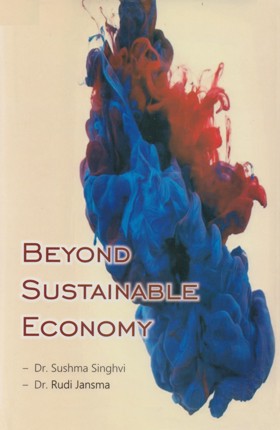In attempting to analyze the Jain concept of aparigraha or non-greed we must keep in mind that Marxist philosophy is rooted in dialectics or duality. So, it becomes quite relevant to see it in the context of the dualities of both aparigraha and parigraha or non-greed and greed. There is no doubt that in the history of mankind parigraha or greed/acquisitiveness has played a far stronger role rather than its opposite aparigraha. In fact the Marxist study of history from the earliest times to modern day can be summed up in terms of man's parigraha or greed. The greed for wealth and property has led the society, over the centuries, to being divided into 'haves' and 'have-nots' thus leading to class and class exploitation, endless wars, violence, trade, industry, technological advancement along with development of arms, armies, conquests, colonization, imperialist hegemony, exploitation etc. is all due to man's insatiable greed to possess more and more. This has become class greed, societies and nation's greed.
It must be borne in mind that Marxism is not a religion but a tool for economic and social change to end the exploitation of man by man and in order to put another political-economic system in place of the present exploitative capitalist one. Jainism, on the other hand, is a religion and seeks to find individual salvation. So the two have very different aims which leads us to important differences between Marxist and Jain outlooks on the matter of aparigraha/parigraha. It must also be borne in mind that Marxism thinks of parigraha in a collective and social sense and not just as an individual negativity. Jainism on the other hand views both parigraha and aparigraha strictly from the point of view of individual choice and development irrespective of society at large.
Unfortunately, our societies have reached a stage where individual aparigraha has no place to change things. The Marxist approach is very much more holistic, collective and with a class approach in order to change society while the Jain approach is very much an individual, personal approach in order to change oneself irrespective of society around us. So, the former is more macro and is conceived in order to establish social change while the latter is more micro and it is limited to changing the individual. It must also be understood that the Marxist approach feels that individual change does not necessarily lead to social change. Marxists believe that humans as a whole are a product of their material environment and it is only by changing that material environment that a new human will be able to emerge.
Looking at history, we realize that parigraha that has been a motivating force continues to still play a major role today. In today's capitalist world everything is measured quantitatively by accumulation of wealth and property whether it be the GDP of a country, corporate profits, earnings on the stock exchange, personal income, social standing, students' marks or personal jewelry. The list is endless. This never-ending fight to get more and more is irrespective of the consequences and tensions it creates on all levels of society. This incessant hunger has brought about not just the most extreme inequitable distribution of wealth, but also the ruthless destruction of societies, of nature and has brought the globe to the edge of destruction with global warming, ozone depletion and we are facing water and food shortages on a massive scale and in which thousands of people are dying. So all we see around us is the ethos of a never-ending parigraha!
Parigraha has not only changed the nature of societies around us but also our laws, morals and ethics have all changed to accommodate this voracious parigraha. Greed, whether on the level of the individual or the collective is now not just an accepted norm but is actively encouraged and acclaimed as a necessary prerequisite for every man, woman or child! It is cloaked in many euphemisms like 'ambition', 'success' and from a young age it is inculcated in children. In the US and in many developed nations people are encouraged to show their patriotic parigraha by buying, through compulsive shopping and consumerism. Imperialist wars are fought under euphemisms for parigraha such as the need to civilise other countries, to bring light to darkness, to have regime change and democracy etc. etc. In the same way aparigraha is mocked by terms such as 'loser', 'drop-out', 'failure' etc. Parigraha is increasing in the society all around us both individually and collectively while rampant consumerism, in all its myriad forms, is the god that is now being worshipped. So, we see that in this age of capitalism it is parigraha in all its levels - from the individual, to governmental, to national and international - that is growing.
All the major basic characteristics of capitalism are rooted in parigraha. Capitalism in its over 400 years of history has clearly shown that its growth and existence rely on parigraha whether in its nature to constantly expand, to forever seek and capture new sources of raw material, exploit cheap labour and to find newer and newer markets in which to sell goods and reap more and more returns. Another basic feature of Marxism which is based on parigraha is the need to continuously make profits at all costs. Marx's Das Capital and Theory of Surplus Value are devoted to explaining how profits are made predominantly by exploiting labor and appropriating a portion that workers have earned by their hard work. The concepts of Free Trade which are bringing modern markets to their knees is steeped in parigraha which went to the barbaric lengths of trading in slaves or in making China a nation of opium addicts in order to prize it open for their aggrandizement. Even today's wars in Iraq, Afghanistan, Libya and Somalia are being waged in order to capture the oil and gas reserves that western powers are so desperate to acquire.
Marxist economics clearly explains how profit or surplus value, which is the basis of capitalist class exploitation, is made by denying the workers/producers their full wages/earnings or fruit of their labor. It is the parigraha or greed of the capitalist that is at the root of economic and social disparity leading to the widening gap between the 'haves' and the 'have nots'. We only have to examine the past centuries of war, plunder, loot, enslavement, rape and pillage to realize that perhaps if there is one thing that has been the major source of human history it has been parigraha! On the economic level we see that the major contradiction under capitalism is that production has become more and more social while appropriation or the snatching of profits is still private parigraha.
The present global economic crisis is mainly due to the greed of banks and corporates who wont hear of any restrictions being imposed on their parigraha and resist any form of regulation thrust on them while refusing to implement any self-imposed regulation. So while there is rampant inflation and unemployment in US and Europe these banking and corporate moguls are taking home ever larger bonuses and pay cheques!
Now, we come to the question: Can the Jain concept of aparigraha be a tool of economic change while one can understand aparigraha on a very personal and individual level of not accumulating more possessions or wealth than one actually requires it is difficult to see how this concept could impact on a national or international level? Economy in the world today is not just personal, or even on a national, but has become international globalization and it is on this macro level that the Jain concept of aparigraha seems to have no meaning or ability to influence world economics. If I, as an individual, gave up drinking liquor or making profits in an unethical manner how would it have any impact on society as a whole? At the most I may be able to slowly influence a few people around me. But in today's world parigraha has coalesced into an aggressive and mighty social force that mows down everything in its path. The parigraha of the liquor mafia, the land mafia or in the rampant arms trade or flesh trade is growing by geometrical progression while ones individual aparigraha has little or no impact! Thus, one sees that while the majority of the business Jain community might believe in aparigraha in theory, in reality they staunchly practice parigraha!
The Marxist approach to curbing greed is so that as many as possible may benefit and not just a handful. This necessitates the forming of a different social and politico-economic system with new aims, new laws and regulations. In fact, one can say that Marxism is collective and socialized aparigraha for the good of all and not just a handful! It is interesting that Jainism, unlike the Patañjali school of thought, saw aparigraha mainly in terms of the economic or material plane of material wealth and possessions because that is also the plane that has been emphasized by Marxist ideology. The individual Jain viewpoint and the collective Marxist viewpoint also throws up the whole dispute of the individual vis-a-vis society and vice versa. The dialectical interrelation between the individual and society has been keenly debated over centuries. Marxism gives priority to the collective development and welfare of society as a whole while Jainism gives priority to individual spiritual welfare. The ultimate objective should be that what is good for the collective should be good for the individual but with the myriad tensions and contradictions between society and the individual this is not always so.
There is no doubt that aparigraha in the form of socialism as imposed by Marxism is imposed on the individual from the outside while aparigraha as a tool of individual change is self-imposed or imposed from within. Somewhere along the line our future education systems will have to take care of this dichotomy so that socialist aparigraha is slowly accepted willingly by every individual. However, both forms of aparigraha, social and individual are necessary if there is to be both individual and social change. They cannot replace each other as the objectives of both are on different levels - one deals with changing society as a whole while the other seeks to change oneself. Both, are eventually necessary for a new world.
 Dr. Rudi Jansma
Dr. Rudi Jansma
 Srilata Swaminathan
Srilata Swaminathan
